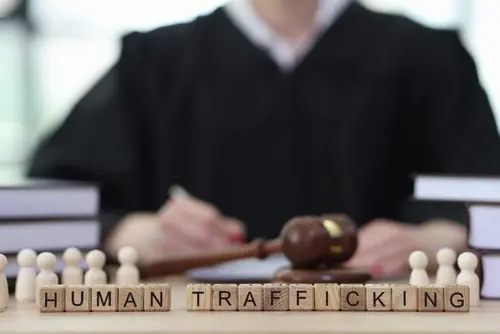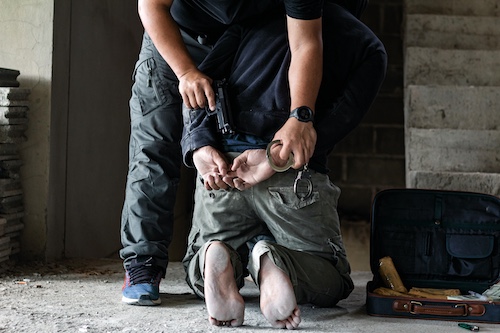Federal human trafficking is a grave crime that involves the exploitation of individuals for labor, services, or commercial sex, often through force, fraud, or coercion. If you’re facing federal human trafficking charges, the stakes are incredibly high. These charges are serious and can lead to decades in prison, heavy fines, and permanent damage to your reputation.
It’s important to work with a federal crimes lawyer who understands how to handle these complex cases. At the Cowboy Law Group in The Woodlands, Texas, our attorneys know how the federal justice system works and can step in quickly to start building your defense.
What Is Human Trafficking?
At its core, human trafficking is the exploitation of another person for labor, services, or commercial sex acts. The federal government, under the Trafficking Victims Protection Act (TVPA) of 2000 and its subsequent amendments, identifies two primary forms of human trafficking: sex trafficking and forced labor.
Sex Trafficking
Sex trafficking is defined as the recruitment, harboring, transportation, provision, obtaining, patronizing, or soliciting of a person for a commercial sex act, where the act is induced by force, fraud, or coercion, or where the person induced is under 18 years of age. Importantly, if the victim is a minor, proof of force, fraud, or coercion is not required for prosecution.
Forced Labor
Forced labor involves the recruitment, harboring, transportation, provision, or obtaining of a person for labor or services, through force, fraud, or coercion, for the purpose of subjecting them to involuntary servitude, peonage, debt bondage, or slavery.
These crimes are codified in federal law under 18 U.S.C. Chapter 77 (sections 1581–1597), which lays out the definitions, prohibited conduct, and penalties for human trafficking offenses.
Elements of Federal Human Trafficking Charges
Federal human trafficking charges can arise from a wide range of conduct, but several key elements are commonly present:
- Exploitation for labor or sex: The core of the offense is the exploitation of a victim, whether for work under abusive conditions or for commercial sex acts.
- Means of control: Traffickers often use force, threats, fraud, coercion, or manipulation to control victims. In the case of minors involved in commercial sex acts, the use of these means does not need to be proven.
- Movement across borders: Federal law does not require proof of movement across borders for a trafficking charge. However, crossing borders can trigger additional federal jurisdiction and charges.
- Vulnerability of victims: Traffickers frequently target individuals who are vulnerable due to poverty, lack of legal status, limited English proficiency, or unstable housing. Victims can be of any age, gender, nationality, or background.
Federal Laws Against Human Trafficking
Several federal laws are used to prosecute human trafficking offenses:
- 18 U.S.C. § 1581: Prohibits peonage (compulsory service to pay off a debt) and related offenses.
- 18 U.S.C. § 1584: Addresses involuntary servitude, including holding or selling individuals in such conditions.
- 18 U.S.C. § 1589: Defines and prohibits forced labor.
- 18 U.S.C. § 1591: Targets sex trafficking of children or by force, fraud, or coercion.
- 18 U.S.C. § 2423: Criminalizes the transportation of minors for illegal sexual activity.
The Mann Act
The Mann Act (18 U.S.C. §§ 2421–2424) makes it a federal crime to transport individuals across state lines for prostitution or other illicit sexual purposes. Originally passed in 1910, this law remains a powerful tool for federal prosecutors.
How Human Trafficking Cases Are Prosecuted
Federal human trafficking cases are typically investigated by agencies such as the FBI, Homeland Security Investigations, and the Department of Justice. These cases often involve complex, multi-jurisdictional investigations, especially when trafficking networks cross state or national borders.
Prosecutors do not need to prove that a victim was physically transported from one place to another; recruitment, harboring, or providing a victim is sufficient. In cases involving minors, the law is particularly strict. Any commercial sex act involving a minor is considered trafficking, regardless of consent or the use of force.
Penalties for Federal Human Trafficking Convictions
Federal law treats human trafficking with the utmost severity, imposing harsh penalties on those convicted. The specific penalties depend on the nature of the offense, the age of the victim, and the methods used by the trafficker.
For example:
- Sex trafficking of children or by force, fraud, or coercion (18 U.S.C. § 1591):
- If the victim is under 14, or if force, fraud, or coercion is used: Minimum of 15 years to life in prison.
- If the victim is aged 14–17: Minimum of 10 years to life in prison.
- Forced labor, peonage, involuntary servitude (18 U.S.C. §§ 1581, 1584, 1589):
- Up to 20 years in prison for standard offenses.
- Up to life in prison if the crime involves aggravating factors such as kidnapping, sexual abuse, or the death of the victim.
- Enticement into slavery: Up to 30 years in prison.
- Obstruction of enforcement: Up to 20 years in prison.
- Restitution and fines: Courts may order traffickers to pay restitution to victims for their losses, and substantial fines can also be imposed.
In addition to criminal penalties, victims have the right to pursue civil damages against their traffickers.
Human Trafficking in Texas
Human trafficking cases often involve one or more of the following scenarios:
- Foreign nationals brought to the U.S.: Traffickers may recruit individuals from other countries, promising legitimate employment, but upon arrival, the victims are forced into labor or commercial sex, often to pay off fabricated debts.
- Domestic trafficking: U.S. citizens, including minors, may be recruited, manipulated, or coerced into commercial sex or forced labor without ever leaving their home state.
- Online exploitation: The internet is increasingly used to recruit, advertise, and exploit victims, making detection and prosecution more complex.
- Labor trafficking in legitimate businesses: Victims may be forced to work in restaurants, hotels, factories, farms, or private homes under abusive conditions, with little or no pay.
Texas, including communities like The Woodlands, is a key focus for federal and state anti-trafficking efforts due to its size, population, and proximity to international borders. Law enforcement agencies in Texas work closely with federal authorities to investigate and prosecute trafficking cases.
Defenses to Federal Human Trafficking Charges
Given the severity of the penalties, defending against federal human trafficking charges requires a sophisticated legal strategy. Common defenses include:
- Lack of knowledge or intent: The prosecution must prove that the defendant knowingly engaged in trafficking conduct.
- No force, fraud, or coercion (for adult victims): If the alleged victim was not subjected to force, fraud, or coercion, and was not a minor, the basis for a trafficking charge may be challenged.
- Insufficient evidence: Challenging the credibility of witnesses, the reliability of evidence, or the methods used by law enforcement can be crucial.
- Mistaken identity or false accusation: In some cases, individuals may be wrongly accused due to mistaken identity or false reports.
Because federal procedures differ significantly from state prosecutions, it is vital for anyone accused of human trafficking to seek experienced federal criminal defense counsel.
The Impact of a Human Trafficking Conviction
A federal human trafficking conviction carries life-altering consequences beyond lengthy prison sentences and financial penalties. Convicted individuals may face:
- Permanent criminal records.
- Mandatory registration as a sex offender (in sex trafficking cases).
- Loss of professional licenses and reputational harm.
- Civil lawsuits from victims seeking damages.
For businesses, even an accusation of involvement in human trafficking can result in severe reputational damage, loss of contracts, and regulatory scrutiny.
The Importance of a Federal Crimes Lawyer
If you’re facing federal human trafficking charges, the stakes are incredibly high. These serious charges can lead to decades in prison, heavy fines, and permanent reputation damage. Defendants need a federal crimes lawyer who understands how to handle these complex cases. At the Cowboy Law Group, our Texas criminal defense attorneys know how the federal justice system works and can step in quickly to start building your defense.
A federal crimes lawyer will carefully review the details of your case, including how law enforcement gathered evidence and whether your rights were violated during the investigation. Human trafficking charges often involve wiretaps, surveillance, and interviews with multiple witnesses. A skilled attorney can challenge illegal searches, unreliable witnesses, or flawed procedures that could lead to getting evidence thrown out.
Your lawyer can negotiate with prosecutors and possibly get charges reduced or dismissed. They can also help you explore alternatives to going to trial, such as plea deals or pre-trial diversion programs, if that’s the right path for your case.
At Cowboy Law Group, we fight hard to protect your freedom and future. Our team is here to stand with you every step of the way, answer your questions, and help you make smart decisions in a difficult time. If you’ve been charged with human trafficking at the federal level, don’t wait to get legal help.
Contact the Cowboy Law Group Today
Federal human trafficking is a serious crime that encompasses both sex and labor exploitation. A conviction can lead to decades in prison and heavy fines. If you’re facing federal human trafficking charges, don’t wait to get legal help.
Our attorneys at the Cowboy Law Group know how the federal justice system works and can step in quickly to start building your defense. Contact us today for a free consultation by calling 832-326-2932 or completing our online form.






